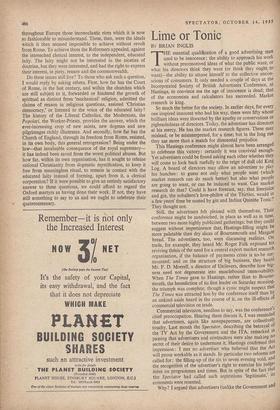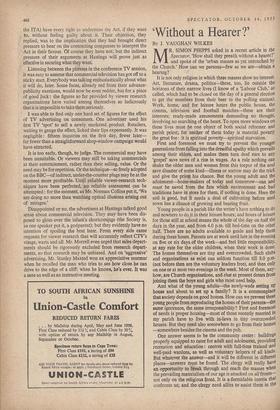Lime or Tonic
BY BRIAN INGLIS THE essential qualification of a good advertising man used to be innocence : the ability to approach his work without preconceived ideas of what the public want, or what his directors think they want (or think they ought, to' want)—the ability to attune himself to the collective uncon- scious of consumers. It only needed a couple of days at the Incorporated Society of British Advertisers Conference, at Hastings, to convince ma the age of innocence is dead; that of the economists and calculators has succeeded. Market research is king.
So much the better for the society. In earlier days, for every , one inspired innocent who had his way, there were fifty whose brilliant ideas were thwarted by the apathy or conservatism or pigheadedness of directors. Today, the advertiser has directors at his mercy. He has the market research figures. These may mislead, or be misinterpreted, for a time; but in the long run they are more than a match for directorial prejudice. This Hastings conference might almost have been arranged to celebrate this victory : certainly it was convivial enough. Yet advertiseis could be found asking each other whether they will come to look back ruefully to the reign of dull old King Log. A board of directors may allow an advertiser to play his hunches : to guess not only what people want (which market research can do much better) but also what people are going to want, or can be induced to want. Can market research do that? Could it have forecast, say, that limejuice and gin,' the subaltern's love-philtre of the Thirties, would in a few years' time be ousted by gin and Indian Quinine Tonic? They thought not. Still, the advertisers felt pleased with themselves. Their conference might be sandwiched, in place as well as in time, between two more highly publicised gatherings; but they could suggest without impertinence that, Hastings-filling might be more palatable than dry slices of Bournemouth and Margate bread. The advertisers, too, were discussing realities. On trade, for example, they heard Mr. Roger Falk expound his reviving thdsis of the need for a central export market research organisation, if the balance of payments crisis is to- be sur- mounted; and on the structure of big business, they heard Mr. F. D. Morrell, a director of Unilevers, describe how big- ness need not degenerate into musclebound immovability. When The Times gave to Hastings, rather than to Bourne• mouth, the benediction of its first leader on Saturday morning, the triumph was complete; though a cynic might suspect that The Times was attracted less by the conference itself than by an unkind aside heard in the course of it, on the ill-effects of commercial television on trade.
Commercial television, needless to say, was the conference's chief preoccupation. Hearing them discuss it, I was reminded that advertisers, again like newspapermen, are collectively touchy. Last month the Spectator, describing the betrayal of the TV Act by the Government and the ITA, remarked In passing that advertisers and contractors were also making no secret of their desire to undermine it. Hastings confirmed this impression : I met no advertiser who believed that the Act will prove workable as it stands. In particular two reforms are called for: the filling-up of the six to seven evening void, and the recognition of the advertiser's right to exercise his judge' ment on programmes and times. But in spite of the fact that the Spectator had called such aspirations 'legitimate,' its comments were resented. Why? I argued that advertisers (unlike the Government and the ITA) have every right to undermine the Act, if they want to, without feeling guilty about it. Their objection, they replied, was to the implication that they had brought direct pressure to bear on the contracting companies to interpret the Act in their favour. Of course they have not; but the indirect pressure of their arguments at Hastings will prove just as effective in securing what they want.
Listening between the phrases in the conference TV session, it was easy to assume that commercial television has got off to a sticky start. Everybody was talking enthusiastically about what it will do, later. Some faces, already red from their advance- publicity exertions, would now be even redder, but for a piece of good luck : the figures so far provided by viewer research organisations have varied among themselves so ludicrously that it is impossible to take them seriously.
I was able to find only one hard set of figures for the effect of TV advertising on consumers. One advertiser used his first TV 'spot' to sell a newly marketed product. Retailers, waiting to gauge the effect, licked their lips expectantly. It was negligible : fifteen inquiries on the first day, fewer later— far fewer than a straightforward shop-window campaign would have attracted.
It is too early, though, to judge. The commercial may have been unsuitable. Or viewers may still be taking commercials at their entertainment, rather than their selling, value. Or the need may be for repetition. Or the technique—so freely adopted on the BBC—of indirect, under-the-counter plugs may be at the moment more profitable. Until reliable viewer-research tech- niques have been perfected, no reliable assessment can be attempted : for the moment, as Mr. Norman Collins put it, 'We are doing no more than watching optical illusions arising out of mirages.'
Disappointed or no, the advertisers at Hastings talked good sense about commercial television. They may have been dis- posed to gloss over the infant's shortcomings (the Society is, as one speaker put it, a godparent); but they evidently have no intention of spoiling the brat later. From every side came requests for viewer research that will accurately reflect CTV's visage, warts and all. Mr. Morrell even urged that sales depart- ments should be rigorously excluded from research depart- ments, so that research may be unbiased. And on 'aggressive' advertising, Mr. Stanley Maxted won an appreciative murmur when he recalled the man who tries to see bow close he can drive to the edge of a cliff; when he knows, he's over, It was a sane as well as an instructive meeting.











































 Previous page
Previous page